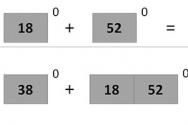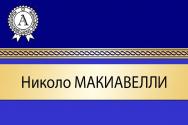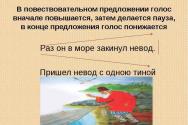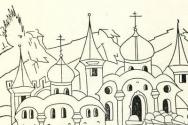The originality of the plot and composition of the play thunderstorm. The plot and compositional originality of the play by A.N.
In the composition “Thunderstorms” Ostrovsky departs from conventional techniques. He deliberately introduces romantic views of nature and uses symbolic contrasts, for example, he compares the description of a thunderstorm with the terrible morals of Kalinov. By this, the playwright expanded the scope of his work, filled it with deep content and meaning, and emphasized that the play has an all-Russian social and everyday character, that we're talking about not about private individual moments, but about typical social phenomena of pre-reform Russia.
Ostrovsky made extensive use of the landscape. The main antithesis given in the drama is free and loving heart and in contrast to it, despotism and tyranny appear more clearly against the background of the Volga landscape. The beauty of nature is contrasted with the ugliness and falsehood of human relationships. Positive heroes dramas - Katerina and Kuligin love nature and see the beauty in it. Kuligin speaks with a shudder about dark morals reigning behind the castles of merchant houses, and lyrically about the beauties of nature: “Okay, sir,” he says to Boris, “let’s go for a walk now. Silence, the air is excellent, the meadows smell of flowers from across the Volga, the sky is clear... Feklusha, as we know, sees “wonderful beauty”, “splendor” in the life of merchant houses, while Kuligin speaks enthusiastically about the “beauty” that in “nature is spilled.” The same goes for Katerina. She contrasts captivity and coercion with freedom, wonderful life nature. She “would fly out into the field and fly from cornflower to cornflower in the wind, like a butterfly,” she loves to remember when, having washed herself with spring water, she met the sunrise while watering the flowers in the garden.
Katerina does not know any other life that could be organized in opposition to life in the merchant’s dungeons, and therefore romantically affirms nature as a symbol of happiness. This desire of Katerina grows more and more in the drama - from her first ecstatic story to Varvara about her childhood to the fiery appeals of the violent winds and, finally, to the suffering affirmation of death. “It’s better in the grave... There’s a grave under the tree, how nice!” The sun warms it, the rain wets it... in the spring the grass will grow on it, so soft... So quiet, so good!
Against the backdrop of the free Volga landscape, Ostrovsky presented the stuffy, disgusting world of despots and tyrants. And on the sparkling blue of the Volga, on the young greenery of the trees, the tragic image of Katerina, thirsting for freedom and beauty, and the gloomy, ugly faces of Kabanikha and Wild appear clearly.
Ostrovsky enhances the contrast between Kabanikha and Dikiy to Katerina by carefully finishing the speech of each of them. The “scolder” Dikoy clearly appears before us upon our first acquaintance with him. “What the hell, you came here to beat me up! - he says to Boris. - Parasite! Get lost!" If curses are characteristic of the Wild’s language, then Kabanikha is noted for her reproaches. She slowly but persistently nags the person. “They don’t really respect elders these days,” she reproaches her son... “Why did you jump out to make a fuss in front of them,” she says to Katerina. Kabanikha’s entire speech consists of reproaches and teachings, perfectly emphasizing her despotic traits and admiration for the family traditions established among the merchants.
Katerina’s speech, often reaching the point of ecstasy, is in perfect harmony with her free impulses, with a passionate longing for happiness. How different are her enthusiastic words from the Wild’s curses: “And what dreams I had, Varenka, what dreams!.. The gardens are somehow extraordinary, and everyone is singing invisible voices... and the mountains and trees seem to be different from usual.. ."
Thus, in the language of the characters, the playwright strictly maintains the main opposition between the two worlds, which further reveals the idea of drama.
The play "The Thunderstorm" was written by Ostrovsky during the summer and autumn 1859 ., was staged in the same year, and was published in 1860. Thisa period of social upsurge, when the foundations of serfdom were cracking. NazA “thunderstorm” is not just a majestic natural phenomenon, but a social upheaval. The drama reflected the rise of the social movement, those onbuildings in which advanced people of the 50-60 era lived.
It was not by chance that the play “The Thunderstorm” was able to pass through the censorship slingshots.At the request of Ostrovsky's friends, censor I. Nordstrem, who favored the filmmaturg, presented “The Thunderstorm” as a non-social accusatory play, satirecultural, but love and everyday life, without mentioning a word in his report aboutDikoy, neither about Kuligin, nor about Feklush. The "thunderstorm" was resolved by dramaticcensored for presentation in 1859, and published in January I860.
In the most general formulation the main theme of “Thunderstorms” can be defined divide as a clash between new trends and old traditions. between the oppressed and the oppressors, between the aspirations of the oppressed people to the free manifestation of their Human rights, spiritual needs and the social and family orders that prevailed in post-reform Russia, household routines.
The theme of “Thunderstorm” is organically connected with its conflicts. The conflict that forms the basis of the plot of the drama is a conflict between the old, from who lived for themselves, based on authoritarian social and everyday principles affecting the entire system of feudal-serf despotism by other progressive aspirations for equality, for human freedom ness.The conflict “Thunderstorms”, reflecting the plot of the depicted life,represents a node of conflicts united by the main conflict -Katerina and Boris with their environment, he is joined by conconflicts between Kuligin and Dikiy and Kabanikha, Kudryash with Dikiy, Boris with Dikiy,Barbarians with Kabanikha, Tikhon with Kabanikha. The play is a true reflectionunderstanding the social relations, interests and struggles of his time.
The general theme of “Thunderstorms” entails a number of specific themes:
a) story by Kuligin, by the remarks of Kudryash and Boris, by the actions of Dikiy and KabanikhaOstrovsky gives a detailed description of the financial and legal situationof both the privileged social strata and the workers of that era hee;
b) outlining Kuligin’s views and dreams, the author introduces us to the viewsthen dominant in people's lives, with the level of cultural demands andstate of social morals. The theme of struggle runs from start to finishbetween reactionary and democratic forces. This struggle is expressed in the images of Dikoy, Kabanikha and Feklushi, on the one hand, and Kuligin and Katerina, on the other;
c) drawing life, interests, desires and experiences of actionwarring faces of "The Thunderstorm", the author reproduces from different sides the then generalcultural and family life of the merchants and philistines. Thus inThe play highlights the problem of social and family relations. OstRovsky, detailing this problem, vividly outlined the position of women inmixed-merchant environment;
d) answering pressing questions of the timeHowever, Ostrovsky painted a broad life background in the play. Heroes talk about important things for their time social phenomena: about the emergence of the first railways, about cholera epidemics, about the development of commercial and industrial activities in Moscow, etc.;
e) along with socio-economic and everyday lifeconditions, the author masterfully painted the surrounding nature, variousthe attitude of the actors towards it.
So, in the words of Goncharov, in “The Thunderstorm” “a broad picture of national life and morals has settled down.” Pre-refor Russia is represented in it both by its socio-economic and cultural tour-moral, and family-everyday appearance.
What's the idea? The author acted as a bold denouncer of social orders; the merciless truth with which the morals of greatruling classes and the position of the working people, turned the play into a mirror of its era. The nature in which people live is wonderful, its riches are limitless, its beauty is amazing. But the social orders that dominate lifeneither, ugly. Under these orders, Ostrovsky says in his play, painthe majority of the population is in material bondage to the rich minorityva. “Who has the money,” Kuligin tells Boris about the morals of his city, “he tries to enslave the poor so that his labors will be even more freemoney - to make money” (D 1, yavl. 3). The rich minority are not satisfied with the grabtogether with the people they enslaved, they are waging a fierce struggle for the ruble and among themselves. “And among themselves,” says Kuligin, “how they live! Trading friendthey undermine each other, they quarrel with each other” (D. I , yavl. 3). In conditions beforereform layer, the majority of the population was oppressed not only economicallyski, but also spiritually. The merchants, confident, like the nobility, in their completeimpunity, carried out trials and reprisals against the enslaved, guided only by their own interests and desires. “If I want,” Dikoy swaggers in front of Kuligin, “I’ll have mercy, if I want, I’ll crush” (D. IV , yavl. 2). In a menacing shout and constant intimidation of those subject to her, the basic law of lifeKabanikha also sees the swarm.
One of the remarkable features of this play is the organica combination of merciless criticism of the old and approval of the new. Revealingtheme and idea of "Thunderstorm", Ostrovsky divides all characters into two basesny groups: oppressors and oppressed, despots and Protestants. Oppress-whether, the “dark kingdom”, according to Dobrolyubov, is, first of all, Wild andKabanikha, representatives of the bourgeoisie, which was quickly gaining strength in pre-reform Russia. (Kabanikha - Marfa Ignatievna Kabanova). To the cliffAll other heroes are considered as heroes.
Composition of the play
A) Exposition - paintings of the Volga expanse and the stuffiness of Kalinovsky morals
(D. I, yavl. 1-4).
b) The beginning - Katerina responds to her mother-in-law’s nagging with dignity and peacefully
replies: “You are talking about me, Mama, in vain. What's in front of people?
that without people, I’m all alone, I don’t prove anything of myself.” First collision nie (D. I, yavl. 5).
V) Next comes the development of the conflict between the heroes, in nature collecting twice there is a thunderstorm (D. I , yavl. 9). Katerina admits to Varvara that she fell in love with Borisand the prophecy of the old lady, a distant clap of thunder; end D. IV. Thunderstorm a cloud creeps in, like a living, half-mad old woman threatens Katerina with death inthe pool and hell, and Katerina confesses to sin (the first climax), falls unconscious. But the thunderstorm never hit the city, only the pre-storm tension tion.
d) Second climax - Katerina delivers the last monologue when
says goodbye not to life, which is already unbearable, but with love: “My friend!
My joy! Goodbye!" (D. V, yavl. 4).
e) The denouement is Katerina’s suicide, the shock of the inhabitants of the city, Tikhon,
who, being alive, envies his dead wife: “It’s good for you. Kate! And I
Why did you stay to live and suffer!..” (D. \, yavl.7).
Genre originality of the play "The Thunderstorm".
By all indications of the genre, the play “The Thunderstorm” is a tragedy, since theThe conflict between the heroes leads to tragic consequences. There is also in the playelements of comedy (tyrant Dikoy with his ridiculous, humiliating peoplesocial dignity by demands, Feklusha’s stories, Kalin’s reasoningtsev), who help to see the abyss that is ready to swallow Katerina and which Cooley unsuccessfully tries to illuminate with the light of reason, kindness and mercy gin.
Ostrovsky himself called the play a drama, thereby emphasizing the widespread conflict of the play, the everyday life of those depicted in it events.
Traditional literary plot(the love triangle Tikhon - Katerina - Boris) became in Ostrovsky’s drama “The Thunderstorm” the basis of the conflict between old and new, not only during the change of generations, but also during the change of old and new in the social life of Russia.
Composition of the drama "The Thunderstorm"
Ostrovsky the playwright turns the usual plot about his wife’s betrayal and her suicide into a study social conditions life of the Russian nation.
The first action is the beginning of the conflict
- characteristics of the morals of the city of Kalinin
(“Cruel morals, sir, in our city”);
- characteristics of the owners of life:
(“We should look for another scolder like our Savel Prokofievich!”),
Kabanikha
(“Prude, sir! He gives money to the poor, but completely eats up his family”);
- Boris's weak-willed position and his love for Katerina
(“And apparently I’m going to waste my youth in this slum”, “... and then I foolishly decided to fall in love”);
- Tikhon's lack of will
(“I, it seems, mummy, don’t take a step out of your will”);
- confrontation between Katerina and Kabanikha
(“Who enjoys tolerating falsehoods!”);
- Information about childhood and love for Boris
(“I lived, didn’t worry about anything, like a bird in the wild,” “After all, this is not good, because this is a terrible sin, Varenka, why do I love someone else?”);
- theme of a thunderstorm (the image of a wild lady) and Katerina’s religiosity
(“How, girl, not to be afraid! Everyone should be afraid”, “...death will suddenly find you as you are, with all your sins, with all your evil thoughts”).
Act Two: Character and Plot Development
A) Tikhon’s departure, Katerina’s last attempt to confront the internal conflict
(“Take me with you”, “I don’t know how to get away, but you still force yourself on me”, “How can I love you when you say such words?”),
Katerina's consent to a date with Boris
(“I would even die to see him”)
B) development of Kabanikha’s character, attitude towards young people
(“But they, too, the stupid ones, want to do their own thing…”)
C) information about Katerina’s character
(“That’s how I was born, hot!”, “I don’t know how to deceive...”, “And if I’m tired of being here, no force can hold me back”);
D) information about Varvara’s character
(“And I was not a liar, but I learned when it became necessary”);
Act three - continuation of the traditional plot of cheating on her husband
Here a meeting between Katerina and Boris takes place, as well as the development of a social conflict.
A) development of the characters of Wild and Kabanikha in dialogues
(“You are deliberately bringing yourself into your heart”);
B) a generalization of the morals of the city of Kalinin in Kuligin’s monologue
“To rob orphans, relatives, nephews, to beat up his family so that they don’t dare say a word about anything he does there”;
C) development of Boris’s character: Boris is not Katerina’s defender (Kudryash’s warning:
“Just look - you’ll make trouble for yourself, and you’ll get her into trouble too”);
D) meeting and explanation between Katerina and Boris. Katerina as a stronger character
(“If you hadn’t come, it seems that I would have come to you myself”).
The fourth act is the climax of the plot
It is accomplished in Katerina’s confession:
A) the development of the plot in Act IV prepares the climax at the end of the action: conversations of the Kalinovites on the boulevard, conversation between Dikiy and Kuligin, dialogue between Varvara and Boris about Katerina’s condition after Tikhon’s return
(“She’s shaking all over, as if she’s got a fever; she’s so pale, she’s rushing around the house, as if she’s looking for something,” “she’ll thump at her husband’s feet and tell everything”),
thunderstorm over the city, appeal of a wild lady
(“Where are you hiding, stupid! You can’t escape God!”);
B) the climax is the recognition of the heroine. Features: on the boulevard, in front of people, which aggravates the conflict.
Act five - denouement
A) Tikhon’s weak-willed behavior
“Mama eats her, and she, like some kind of shadow, walks around unresponsive,” “I’ll take it and drink the last one I have; then let my mother babysit me like I’m a fool”);
B) the flight of Varvara and Kudryash as a way out of the “dark kingdom”:
B) development internal conflict in Katerina’s soul: the impossibility of life in the Kabanov family and the fear of suicide as a sin
(“... I’ve already ruined my soul”);
D) meeting with Boris - analogous to saying goodbye to Tikhon before leaving for Moscow
(“Take me with you from here! - I can’t, Katya. I’m not going of my own free will”),
a decision is brewing in Katerina
(“don’t let a single beggar pass by, give it to everyone and order them to pray for my sinful soul);
D) resolution of external and internal conflict - the decision to die. Death as deliverance
(“They won’t pray? Those who love will pray... But they’ll catch me and force me back home... Oh, hurry, hurry!”);
E) reaction to Katerina’s suicide as a protest against this world
“Her body is here, take it; but the soul is now not yours: it is now before the Judge, who is more merciful than you!”
“Mama, you ruined her! "
Conclusion
"Thunderstorm" is the most decisive work Ostrovsky",
According to her, the composition and plot of this work make Katerina one of the most decisive heroines of Russian literature.
Did you like it? Don't hide your joy from the world - share itMaterials are published with the personal permission of the author - Ph.D. O.A. Mazneva (see “Our Library”)
Ostrovsky's drama "The Thunderstorm" significant work famous playwright. It was written in 1860 during a period of social upsurge, when the foundations of serfdom were cracking and a storm was brewing in the stuffy atmosphere of reality. Ostrovsky's play takes us to the merchant environment, where the Domostroev order was most persistently maintained. Residents of a provincial town live a closed life alien to public interests, in ignorance of what is happening in the world, in ignorance and indifference. Their range of interests is limited to household chores. Behind the external calm of life lie dark thoughts, the dark life of tyrants who do not recognize human dignity. Representatives of the “dark kingdom” are Dikoy and Kabanikha. The first complete type of tyrant merchant, whose meaning of life is to amass capital by any means. The main theme of the thunderstorm is the clash between new trends and old traditions, between the oppressed and the oppressors, between the desire of people for the free manifestation of their human rights, spiritual needs, and the prevailing social and family order in Russia.
If we consider “The Thunderstorm” as a social and everyday drama, then the resulting conflict looks quite simple: it is, as it were, external, social; the attention of the audience is equally distributed between the characters, all of them, like checkers on a board, play almost identical roles necessary to create the plot outline, they confuse and then, flashing and rearranging, as in tag, help resolve the confusing plot. If the system of characters is laid out in such a way that the conflict arises and is resolved, as it were, with the help of all the characters. Here we are dealing with an everyday drama; its conflict is simple and easy to guess.
Ostrovsky’s play “The Thunderstorm” raises the problem of the turning point in social life that occurred in the 50s, the change in social foundations. The author cannot be absolutely impartial, but it is very difficult for him to express his position - the author's position is revealed in remarks, of which there are not very many and they are not expressive enough. There is only one option left - the author’s position is presented through a certain character, through composition, symbolism, etc.
The names in the play are very symbolic. The speaking names used in “The Thunderstorm” are an echo of the classic theater, the features of which were preserved in the late 60s of the 19th century.
The name Kabanova vividly portrays to us an overweight woman with a difficult character, and the nickname “Kabanikha” complements this unpleasant picture.
The author characterizes the wild as a wild, unrestrained person.
The name Kuligin has many meanings. On the one hand, it is in tune with Kulibin, a self-taught mechanic. On the other hand, “kuliga” is a swamp.
For a long time, critical literature has focused on one conflict or the other. But the author gave the work more deep meaning- This is a people's tragedy.
Dobrolyubov called Katerina “a ray of light in a dark kingdom,” but later, a few years later, Ostrovsky himself gave such people the name “warm heart.” Indeed, this is a conflict between a “hot heart” and the surrounding icy environment. And a thunderstorm as a physical phenomenon is trying to melt this ice. Another meaning put by the author into a thunderstorm symbolizes the wrath of God, and everyone who is afraid of a thunderstorm is not ready to accept death and stand before the judgment of God, or they think so. But the author puts his words into Kuligin’s mouth. “The judge is more merciful than you,” he says. In this way he characterizes his attitude towards this society. And this ending expresses hope. Ostrovsky divides all his time in Kalinov, like the play, into day and night. During the day, people play the faithful, living according to “Domostroy,” and at night they take off their masks. Young people go out and have fun, and the elders turn a blind eye to it. Author's position is expressed partly in Kuligin’s monologues, partly it can be understood from the opposition of Katerina and Kabanikha. The author’s position is expressed in the composition. The composition features two possible options climax and denouement.
Of course, the play is written on a social and everyday theme: it is characterized by Special attention the author’s focus on depicting the details of everyday life, the desire to accurately convey the atmosphere of the city of Kalinov, its “cruel morals”. The fictional city is described in detail and in many ways. The landscape concept plays an important role, but a contradiction is immediately visible here: Kuligin speaks of the beauty of the distances beyond the river, the high Volga cliff. “Nothing,” Kudryash objects to him. Pictures of night walks along the boulevard, songs, picturesque nature, Katerina’s stories about childhood - this is the poetry of Kalinov’s world, which collides with the everyday cruelty of the inhabitants, stories about “naked poverty.” The Kalinovites have preserved only vague legends about the past - Lithuania “fell from the sky to us”, news from big world The wanderer Feklusha brings them. Undoubtedly, such attention by the author to the details of the characters’ everyday life makes it possible to talk about drama as a genre of the play “The Thunderstorm”.
Another feature characteristic of drama and present in the play is the presence of a chain of intra-family conflicts. At first it is a conflict between the daughter-in-law and mother-in-law behind the locks of the house gate, then the whole city learns about this conflict, and from an everyday one it develops into a social one. The expression of conflict in the actions and words of the characters, characteristic of drama, is most clearly shown in the monologues and dialogues of the characters. So, we learn about Katerina’s life before marriage from a conversation between young Kabanova and Varvara: Katerina lived “not worried about anything,” like a “bird in the wild,” spending the whole day in pleasures and household chores. We know nothing about the first meeting of Katerina and Boris, or how their love began. In his article, N.A. Dobrolyubov considered the insufficient “development of passion” to be a significant omission, and said that this is why the “struggle between passion and duty” is designated “not quite clearly and strongly” for us. But this fact does not contradict the laws of drama.
The originality of the “Thunderstorms” genre is also manifested in the fact that, despite the gloomy, tragic overall coloring, the play also contains comic and satirical scenes. Feklushi’s anecdotal and ignorant stories about the Saltans, about lands where all the people “have dog heads,” seem ridiculous to us. After the release of “The Thunderstorm,” A.D. Galakhov wrote in a review of the play that “the action and the catastrophe are tragic, although many places excite laughter.”
What is the composition of the play "The Thunderstorm"? and got the best answer
Answer from Iyuta[expert]
Exposition, plot, development of conflict, climax, denouement.) Now remember the plot)) Composition. The first act is a detailed exposition. Ostrovsky needed it to give an initial idea of characters, about the relationships that prevail in the city of Kalinov.
The inhabitants of the city constantly feel the cruel and limitless power of their owners. Hence the word bondage so often repeated by the characters in the play. Katerina, Boris, Tikhon, Varvara talk about her.
It was very important for the playwright to choose a hero through whose mouth he could give a general picture of the life and customs of the city of Kalinov. Such a person in the play is the self-taught mechanic Kuligin: it is he who owns the words about the beauty of the surrounding nature, it is he who is able to appreciate what is happening around him. He tells Boris about “ cruel morals" cities. Almost next to Kuligin’s monologue, the play gives the monologue of the wanderer Feklushi (“And the merchants are all pious people, adorned with many virtues!”). Kuligin gives Kabanova a different assessment: “Prude, sir! He gives money to the poor, but completely eats up his family. .
The fifth phenomenon reveals family relationships, which reign in Kabanova’s house. .
A sharp clash of characters begins to be felt in this phenomenon. One can feel the internal protest of both Tikhon, Varvara, and most importantly, Katerina. But Tikhon hides his dissatisfaction behind deceitful phrases full of humiliation, Varvara speaks “to herself,” and Katerina, “both in front of people and without people... all alone,” speaks to Kabanikha as an equal and, unlike Tikhon, even addresses her as "you". It is in Katerina that Kabanov sees his opponent.
In the seventh scene, Katerina talks about herself, about her life in her parents’ home, and one can feel the depth and poetry of her inner world. The impressions of past years constitute a sharp contrast with the furnishings of the Kabanovsky house (“I have completely withered here”).
Katerina suffers both from the difficult atmosphere in Kabanikha’s house and from the consciousness of her secret love for Boris, hence the premonition of trouble. The tragic motive (“To be miserable for someone!.. To be in trouble!”) permeates the first and second acts and sounds throughout the entire play.
In the first act, Ostrovsky leads the viewer from the general picture of morals and characters to the Kabanova family and further to the emotional drama of Katerina
^ The main event of the second act is Tikhon’s farewell to Moscow, which allows the playwright to more fully reveal the Domostroev order that reigns in the Kabanovsky house, the psychology and characters of the characters. In the farewell scene there is a new clash between Kabanikha and Katerina. We see Tikhon’s inability not only to protect, but also to understand Katerina, whose last hopes of finding support in her husband are crumbling, hence her cry, full heartache: “Oh, my misfortune, my misfortune! Where can I, poor thing, go? Who should I grab hold of? My fathers, I am perishing!” .
^ The second act and, in particular, the scenes of Tikhon’s farewell and the subsequent monologue of Katerina with the key (the tenth phenomenon) is the beginning of the drama, the turning point, followed by the development of the action.
“Oh, if only the night would speed up!..” - these words of Katerina end the second act of the drama, but the third begins not with the scene of the night date, which the heroine is waiting for, but with the conversation between Kabanikha and Feklushi at the gates of the Kabanovsky house. This action is divided by the playwright into two pictures (scenes), sharply opposed to each other.
The story of the wanderer Feklusha about her visit to Moscow, which Kabanov listens attentively, is colored with a gloomy foreboding - according to all signs, the “last times” are coming: in the city there is only empty bustle, “promenades and games, and an indo roar is going through the streets... a fiery serpent has become harness."
^ Second picture - date night
Let us turn to the dialogue between Katerina and Boris. They seem to speak different languages, feel differently. The consciousness of her sinfulness does not leave Katerina; she stands, “without raising her eyes,” almost does not see, does not listen to Boris. Her passionate “You” is contrasted in the dialogue with the cautious “you”. With which Boris addresses her. IN








